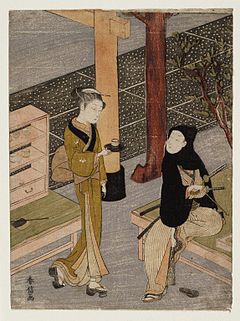Difference between revisions of "Kasamori Osen"
(tiny expansion) |
|||
| Line 6: | Line 6: | ||
Kasamori Osen was a waitress at the Kagiya teashop near Kasamori [[Inari]] Shrine in Yanaka, a neighborhood of Edo; the shop was owned by her father, Kagiya Gohei. Osen was made famous as a local beauty by a number of ''[[ukiyo-e]]'' artists of the time, [[Suzuki Harunobu]] first among them, who took her as the subject of their prints. | Kasamori Osen was a waitress at the Kagiya teashop near Kasamori [[Inari]] Shrine in Yanaka, a neighborhood of Edo; the shop was owned by her father, Kagiya Gohei. Osen was made famous as a local beauty by a number of ''[[ukiyo-e]]'' artists of the time, [[Suzuki Harunobu]] first among them, who took her as the subject of their prints. | ||
| − | Along with [[Ofuji]] of the Hon'yanagi toothpick shop and [[Oyoshi]] of the Tsutaya teahouse, she was apparently categorized as one of "The Three Beauties" in at least one publication of the times (the 1779 ''Ameuri Dohei-den'' <!--売飴土平伝--> by [[Ota Nampo|Ôta Nampô]], who had also mentioned her in a work nine years earlier). Over time, her fame grew, and she appeared not only in single-sheet prints, but also in woodblock printed books, [[kabuki]] plays, and in doll form.<ref>"[http://www.aisf.or.jp/~jaanus/deta/k/kasamoriosen.htm Kasamori Osen]". JAANUS. 2001. Accessed 24 Feb 2011.</ref> Some ''[[Nihonga]]'' painters, such as [[Masuda Gyokujo]], even painted her in the 20th century, harkening back to Harunobu. | + | Along with [[Ofuji]] of the Hon'yanagi toothpick shop and [[Oyoshi]] of the Tsutaya teahouse, she was apparently categorized as one of "The Three Beauties" in at least one publication of the times (the 1779 ''Ameuri Dohei-den'' <!--売飴土平伝--> by [[Ota Nampo|Ôta Nampô]], who had also mentioned her in a work nine years earlier). Over time, her fame grew, and she appeared not only in single-sheet prints, but also in woodblock printed books, [[kabuki]] plays such as "''[[Kaidan tsuki Kasamori]]''"<ref>"Kasamori Osen." ''Nihon kokugo dai jiten'' 日本国語大辞典. Shogakukan, Inc. Accessed via JapanKnowledge online resource, 25 February 2011.</ref>, and in doll form.<ref>"[http://www.aisf.or.jp/~jaanus/deta/k/kasamoriosen.htm Kasamori Osen]". JAANUS. 2001. Accessed 24 Feb 2011.</ref> Some ''[[Nihonga]]'' painters, such as [[Masuda Gyokujo]], even painted her in the 20th century, harkening back to Harunobu. |
Around age 17-19 when she was being painted by Harunobu, beginning in 1770/2, when she was 19, she disappeared from public view, and only her father was seen at the teashop. It is said many wondered what had happened to her and worried; she had married Kurachi Masanosuke<!--倉地政之助-->, a ''[[oniwaban]]'' (shogunate guard or spy), and had become sequestered away from public life, living in a mansion at the [[Sakuradamon]] for the rest of her long and, it is said, happy life.<ref>"[http://kotobank.jp/word/%E7%AC%A0%E6%A3%AE%E3%81%8A%E4%BB%99 Kasamori Osen]." ''Asahi Nihon rekishi jinbutsu jiten'' (朝日日本歴史人物事典, "Asahi Encyclopedia of Japanese Historical Figures"). Asahi Shimbun-sha. Accessed via Kotobank.jp, 24 February 2011.</ref> | Around age 17-19 when she was being painted by Harunobu, beginning in 1770/2, when she was 19, she disappeared from public view, and only her father was seen at the teashop. It is said many wondered what had happened to her and worried; she had married Kurachi Masanosuke<!--倉地政之助-->, a ''[[oniwaban]]'' (shogunate guard or spy), and had become sequestered away from public life, living in a mansion at the [[Sakuradamon]] for the rest of her long and, it is said, happy life.<ref>"[http://kotobank.jp/word/%E7%AC%A0%E6%A3%AE%E3%81%8A%E4%BB%99 Kasamori Osen]." ''Asahi Nihon rekishi jinbutsu jiten'' (朝日日本歴史人物事典, "Asahi Encyclopedia of Japanese Historical Figures"). Asahi Shimbun-sha. Accessed via Kotobank.jp, 24 February 2011.</ref> | ||
Revision as of 15:41, 25 February 2011

Kasamori Osen was a waitress at the Kagiya teashop near Kasamori Inari Shrine in Yanaka, a neighborhood of Edo; the shop was owned by her father, Kagiya Gohei. Osen was made famous as a local beauty by a number of ukiyo-e artists of the time, Suzuki Harunobu first among them, who took her as the subject of their prints.
Along with Ofuji of the Hon'yanagi toothpick shop and Oyoshi of the Tsutaya teahouse, she was apparently categorized as one of "The Three Beauties" in at least one publication of the times (the 1779 Ameuri Dohei-den by Ôta Nampô, who had also mentioned her in a work nine years earlier). Over time, her fame grew, and she appeared not only in single-sheet prints, but also in woodblock printed books, kabuki plays such as "Kaidan tsuki Kasamori"[1], and in doll form.[2] Some Nihonga painters, such as Masuda Gyokujo, even painted her in the 20th century, harkening back to Harunobu.
Around age 17-19 when she was being painted by Harunobu, beginning in 1770/2, when she was 19, she disappeared from public view, and only her father was seen at the teashop. It is said many wondered what had happened to her and worried; she had married Kurachi Masanosuke, a oniwaban (shogunate guard or spy), and had become sequestered away from public life, living in a mansion at the Sakuradamon for the rest of her long and, it is said, happy life.[3]
References
- ↑ "Kasamori Osen." Nihon kokugo dai jiten 日本国語大辞典. Shogakukan, Inc. Accessed via JapanKnowledge online resource, 25 February 2011.
- ↑ "Kasamori Osen". JAANUS. 2001. Accessed 24 Feb 2011.
- ↑ "Kasamori Osen." Asahi Nihon rekishi jinbutsu jiten (朝日日本歴史人物事典, "Asahi Encyclopedia of Japanese Historical Figures"). Asahi Shimbun-sha. Accessed via Kotobank.jp, 24 February 2011.